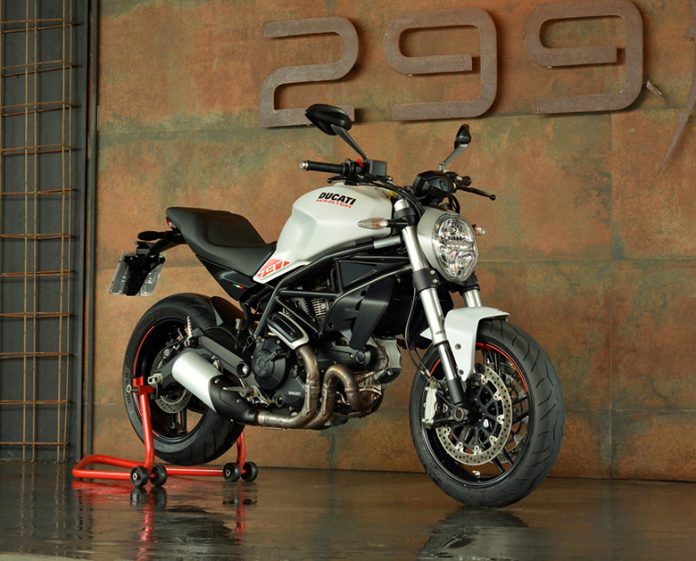The broad handlebars, tank, trellis frame, engine, and double-sided swingarm are seamlessly integrated into the Ducati Monster 797 2019 Naked Motorcycle’s beautiful and powerful appearance. Compact, sports-inspired design that is unmistakably Monster at first sight is what you’ll find in this collection.
Riding pleasure is ensured by the Desmodue twin, which has 73 horsepower and 6,8 kgm of torque. Torque curves that are both smooth and steady inspire confidence right away. Having a good time is a given! For individuals with a limited license, a 35-kW regulated power version of the Monster 797 is also available. Maximizing rider comfort is the primary goal of the Monster 797’s chassis design. An agile and athletic bike in city traffic thanks to its small size, a low and narrow seat, a broad handlebar, and decreased weight.
Ducati Monster 797 2019 Naked Motorcycle – Features and Specs
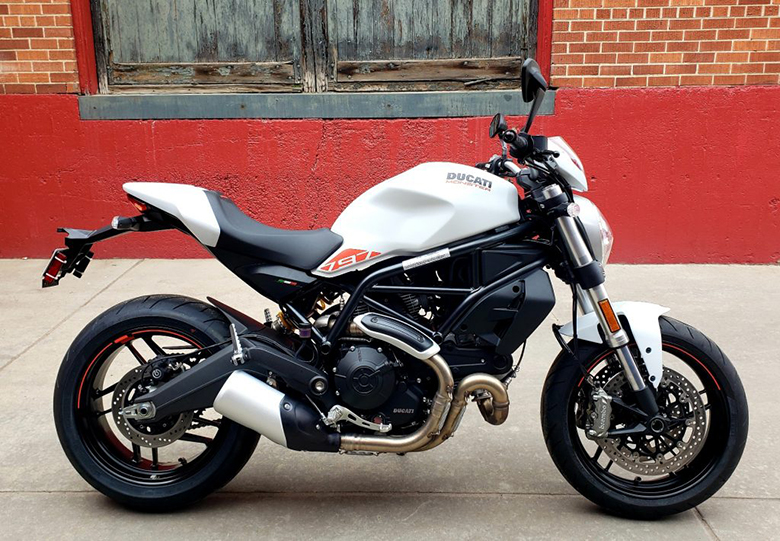
Design
The Ducati Design Center has created the Monster 797, a small, sporty motorcycle with a dynamic personality that encompasses everything the Monster stands for. The tank is a Complete Monster, and it has an attaching clip on the front, much like the original Monster from 1992. It’s a modern spin on the original circular headlamp on this legendary naked bike from the beginning.
Monster 797’s frame is more than simply a structural component; it’s a design aspect that returns to its single-piece beginnings, incorporating the standard tubular grip rails for passenger use. First-generation Monster-inspired cooling fins may be found on the Desmodue twin-cylinder air-cooled engine.
The Monster 797 is a hybrid of classic and cutting-edge design characteristics. It has LCD gauges, LED lighting on the sides and at the back, and updated switchgear.
In addition to the Trellis frame, a lightweight, sporty cast aluminum twin-sided swingarm with a laterally placed shock absorber can be seen in the chassis set-up. There is also a reference to the 696 from 2008 through a triangular swingarm.
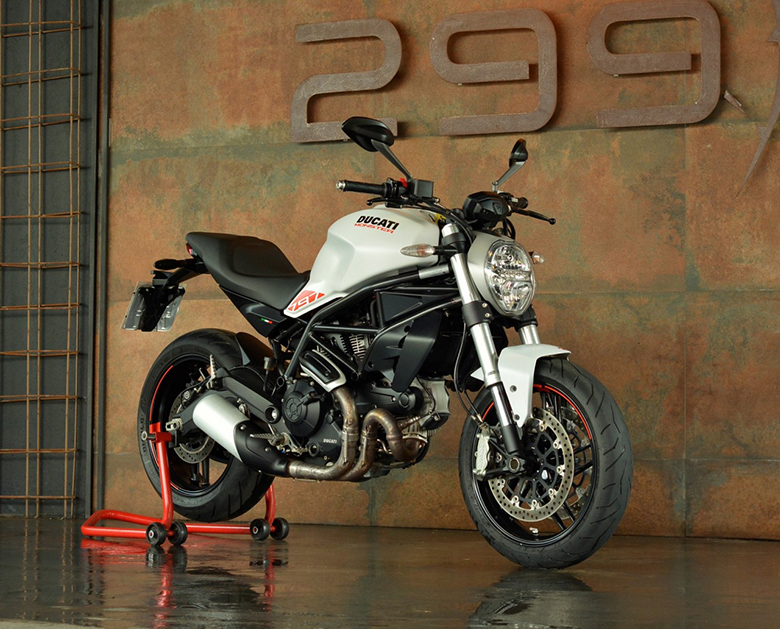
Engine
The Monster 797’s 803cc Desmodue L-twin engine is air-cooled. Although it has a striking resemblance to the original Monster, its Euro 4 engine can produce 75 hp at 8,250rpm and 50.8 lb.-ft of torque at 5,750 rpm. To deliver authentic Ducati riding enjoyment without ever being unduly tricky, the bore and stroke specifications are 88 mm and 66 mm, respectively.
Two sub-butterfly injectors are used in the Monster 797’s twin-cylinder engine, which guarantees smooth power delivery and precise control of the fuel mix aspirated into the cylinders. The 2-in-1 exhaust has been developed to provide excellent heat shielding and superior fluid dynamics for the rider and passenger.
APTC wire-controlled wet multi-plate clutch enables light lever movement and the extra benefit of superb responsiveness: a significant aid in the continual start-stop of city traffic. The gearbox has six speeds. During downshifts, the clutch incorporates a servo-assisted slipper function that helps keep the back wheels stable. The Monster 797 engine is designed to be dependable and straightforward, with a maintenance frequency of 12,000 kilometers.
Frame
Traditional tubular Ducati Trellis frames are used on the Monster 797. The Monster’s steel tank and the L-twin engine can be seen in full view, making it a distinctive bike feature. The 1,435 mm wheelbase provides excellent agility in traffic and stability at high speeds owing to the frame’s well-matched cast aluminum twin-sided swingarm.
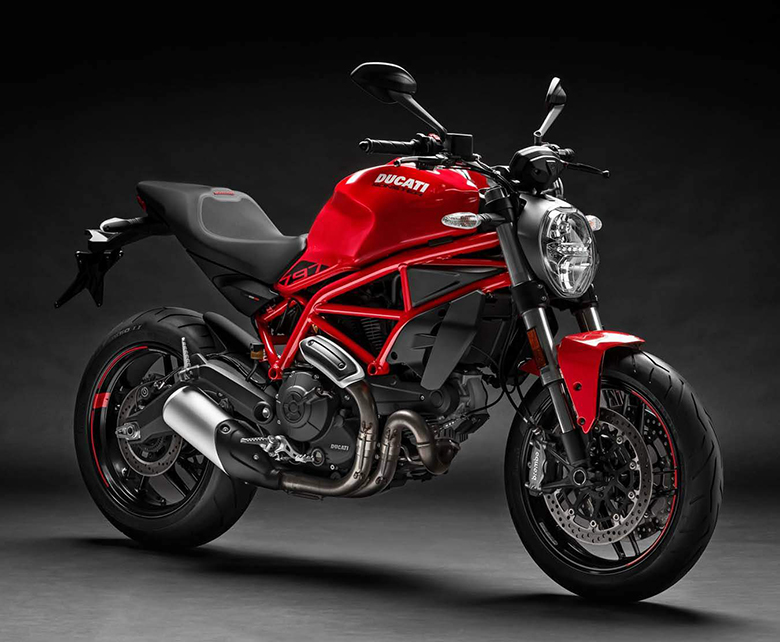
The 16.5-liter gasoline tank gives the Monster its signature appearance. The low seat (805 mm from the ground), broad handlebars, and large steering lock contribute to the bike’s maneuverability, both at a stop and while riding away.
Suspension
With 130 mm of travel, the Monster 797’s Kayaba fork has a 43 mm diameter. Instead, a Sachs shock absorber is used at the back for suspension. Forks and swingarms are not linked by a rising rate linkage, allowing for various spring preload and rebound damping adjustments to be made—150 millimeters of rear-wheel travel.
Tires and wheels
Alloy wheels with ten spokes are fitted to the Monster 797. The dual-compound Pirelli Diablo Rosso II tires provide improved mileage while maintaining a steady grip, especially during aggressive cornering. Pirelli Enhanced Patch Technology (EPT) and Functional Groove Design (FGD) maximize contact patch area regardless of lean angle in these high-quality tires. The motorcycle has 120/70ZR17 at the front and 180/55ZR17 at the back are tire sizes.
Braking system
There is an internal pressure sensor in the Brembo braking system on the Monster 797. The Monster 797’s front brakes include Brembo M4.32 4-piston monobloc calipers clamping 320 mm discs and an axial-pump brake lever with an integrated fluid reservoir for maximum stopping power and safety. There is just one 245 mm disc at the back, and it too has a Brembo caliper and enhanced efficiency sintered brake pads like the front. As a trademark of Ducati, top-notch braking performance is ensured by components like these.
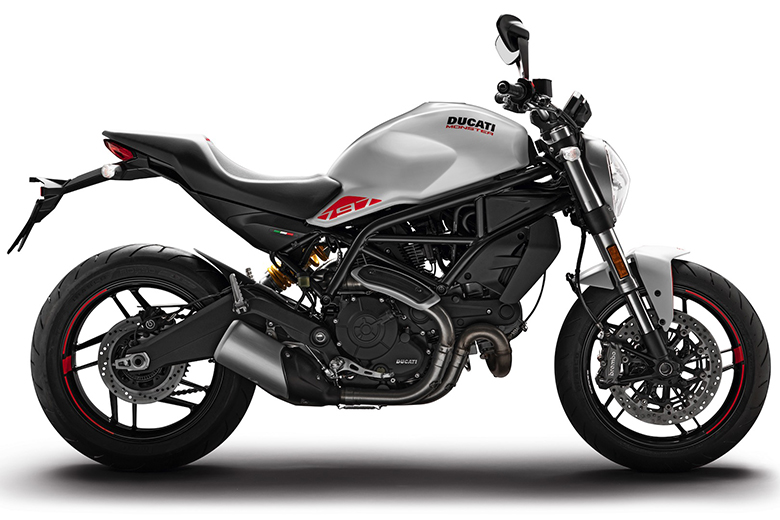
LCD Instrumentation
Large, easy-to-read LCD screens are used in the Monster 797’s instrument panel to display primary and secondary information. In addition to speed and rpm, it also displays the total distance traveled, trips 1 and 2, engine oil temperature, and a timer. In addition, it provides the average speed and the duration of the journey.
Headlight and indicators
Headlight with an LED sidelight on the Monster 797 is characterized by its current design and cutting-edge technological advances. At the back, an LED light is also included. The indication switch on the Monster 797 may be used to turn on the vehicle’s danger warning lights.
Ducati Monster 797 2019 Naked Motorcycle – Technical Specifications
Engine
| Type | L-Twin, 2 Desmodromically actuated valves per cylinder, Air-cooled |
| Displacement | 803cc (49 cu in) |
| Bore x stroke | 88 mm x 66 mm (3.46 inches x 2.60 inches) |
| Compression ratio | 11.0:1 |
| Power | 75 hp (55 kW) at 8250 rpm |
| Torque | 50.8 lb-ft (68.9 Nm) at 5750 rpm |
| Fuel injection | Electronic fuel injection system, Ø 50 throttle bodies |
| Exhaust | 2-1 system having catalytic converter and two lambda probes, single stainless steel muffler including aluminum cover |
| Transmission | Gearbox 6 speed |
| Primary drive | Straight cut gears, Ratio 1.85:1 |
| Final drive | Chain drive, Front sprocket Z15, Rear sprocket Z46 |
| Clutch | APTC wet multi-plate clutch with mechanical control |
Chassis
| Frame | Tubular steel trellis frame |
| Front suspension | Ø43 Kayaba USD fork |
| Front-wheel | 10-spoke light alloy, 3.50” x 17” |
| Front tire | Pirelli Diablo Rosso II, 120/70 ZR17 |
| Rear suspension | Sachs mono-shock, Pre-load and rebound adjustable |
| Rear-wheel | 10-spoke light alloy, 5.50” x 17” |
| Rear tire | Pirelli Diablo Rosso II, 180/55ZR17 |
| Wheel travel (front/rear) | 130 mm/150 mm (5.12 inches/5.91 inches) |
| Front brake | 2 x Ø 320 semi-floating discs, radially attached monobloc Brembo M4.32 calipers, 4-piston, axial pump with Bosch ABS as standard equipment |
| Rear brake | Ø 245 disc, 1-piston caliper with Bosch ABS as standard equipment |
| Instrumentation | LCD |
Dimensions and weight
| Dry weight | 175 kg (386 lb) |
| Wet weight (kerb) | 193 kg (425 lb) |
| Wet weight (no fuel) | 182 kg (401 lb) |
| Seat height | 805 mm (31.69 in) |
| Wheelbase | 1435 mm (56.50 in) |
| Rake | 24° |
| Trail | 90 mm (3.54 in) |
| Fuel tank capacity | 16.5 l (4.36 US gal) |
| Number of seats | 2 |
| Standard equipment | Bosch’s abs led position light and tail light, USB power socket, Passenger seat cover, flyscreen, DMS ready |
Warranty
| Warranty | 24 months |
| Maintenance service interval | 12000 km (7500 mi) / 12 months |
| Valve clearance check | 12000 km (7500 mi) |
Emissions e consumption
| Standard | Euro 4 |
| Co2 emissions | 119 g/km |
| Consumption | 5.3 l/100 km |

